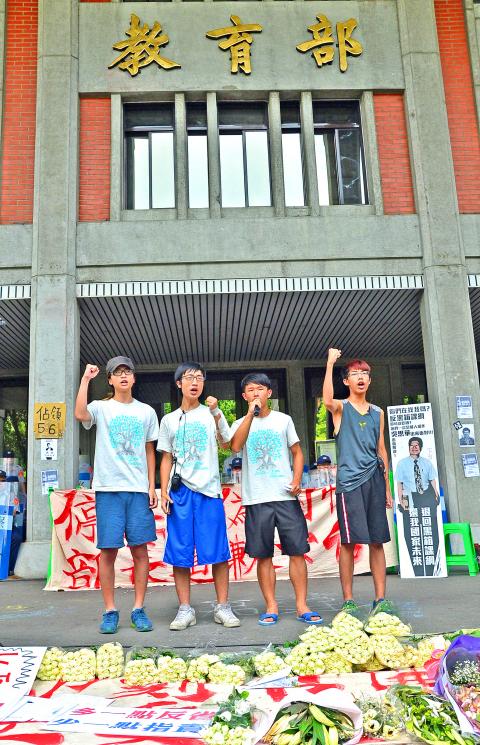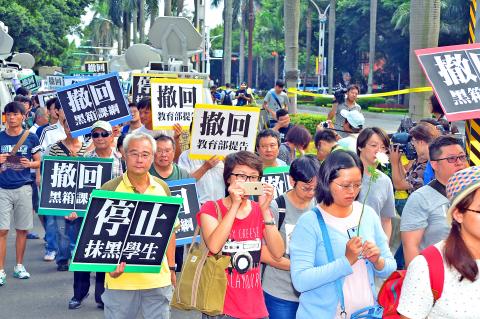A potential solution to the great divide between the Ministry of Education and the student protesters occupying the ministry to protest against controversial high-school curriculum guidelines might be in the making, as former National Taichung First Senior High School dean Tsai Ping-kun (蔡炳坤) attempted to mediate a deal yesterday.
Consensus was reached at 10pm last night that Minister of Education Wu Se-hwa (吳思華) would meet with representatives of the student protesters this afternoon to attempt to reconcile their differences.
Chu Chen (朱震), convener of the Northern Taiwan Anti-Curriculum Changes Alliance, said that he, alliance spokesman Wang Pin-chen (王品蓁), four other student members and Taichung First Senior High School student Liao Chung-lun (廖崇倫), former spokesman of the Apple Tree Commune student club, which started the debate against the controversial curriculum guideline adjustments, would attend the meeting. Three teachers are also to accompany them to the meeting.

Photo: Wang Yi-sung, Taipei Times
According to Ministry of Education Secretary-General Wang Chun-chuan (王俊權) the meeting could be transmitted live online and the ministry would arrange a news conference afterward.
A number of protesters, mainly high-school students, entered the ministry compound early on Friday during a demonstration against the controversial high-school textbook guideline adjustments, which went into effect on Saturday. The student occupation of the plaza inside the ministry gates yesterday surpassed 60 hours.
The students have demanded that Wu resign, that the implementation of the new guidelines be halted and an extra legislative session to review the changes.

Photo: Wang Yi-sung, Taipei Times
A number of civic groups yesterday afternoon staged a march around the perimeter of the building in support of the students.
Earlier yesterday, the presidents of five private universities called for the students to withdraw as soon as possible and begin a rational dialogue with the ministry.
Samuel Chang (張光正), of Chung Yuan Christian University, read the announcement at a news conference, saying the group understood the objectives of the students’ protest and approved of their ideals, but condemned any unlawful and disorderly activity, and hoped the issue could be discussed in a rational manner.
The group of university presidents also said they were apprehensive the radical approaches of some students might set a bad example, expressing concern the issue could make Taiwanese society more confrontational and impair the nation’s competitiveness in the future. They called on the ministry to invite professionals, experts and student representatives to build a dialogue and find a solution, while urging the students to end their protest and withdraw from the premises.
The statement was signed by Chang and his counterparts at Tatung University, Chinese Culture University, Shih Chien University and the Taipei-based China University of Technology, as well as 10 academics.
In response, the student protesters released their own statement, saying: “We all want to return to our normal lives, but [they] should return normal textbook guidelines to us first.”

CHAOS: Iranians took to the streets playing celebratory music after reports of Khamenei’s death on Saturday, while mourners also gathered in Tehran yesterday Iranian Supreme Leader Ayatollah Ali Khamenei was killed in a major attack on Iran launched by Israel and the US, throwing the future of the Islamic republic into doubt and raising the risk of regional instability. Iranian state television and the state-run IRNA news agency announced the 86-year-old’s death early yesterday. US President Donald Trump said it gave Iranians their “greatest chance” to “take back” their country. The announcements came after a joint US and Israeli aerial bombardment that targeted Iranian military and governmental sites. Trump said the “heavy and pinpoint bombing” would continue through the week or as long

TRUST: The KMT said it respected the US’ timing and considerations, and hoped it would continue to honor its commitments to helping Taiwan bolster its defenses and deterrence US President Donald Trump is delaying a multibillion-dollar arms sale to Taiwan to ensure his visit to Beijing is successful, a New York Times report said. The weapons sales package has stalled in the US Department of State, the report said, citing US officials it did not identify. The White House has told agencies not to push forward ahead of Trump’s meeting with Chinese President Xi Jinping (習近平), it said. The two last month held a phone call to discuss trade and geopolitical flashpoints ahead of the summit. Xi raised the Taiwan issue and urged the US to handle arms sales to

State-run CPC Corp, Taiwan (CPC, 台灣中油) yesterday said that it had confirmed on Saturday night with its liquefied natural gas (LNG) and crude oil suppliers that shipments are proceeding as scheduled and that domestic supplies remain unaffected. The CPC yesterday announced the gasoline and diesel prices will rise by NT$0.2 and NT$0.4 per liter, respectively, starting Monday, citing Middle East tensions and blizzards in the eastern United States. CPC also iterated it has been reducing the proportion of crude oil imports from the Middle East and diversifying its supply sources in the past few years in response to geopolitical risks, expanding

Pro-democracy media tycoon Jimmy Lai’s (黎智英) fraud conviction and prison sentence were yesterday overturned by a Hong Kong court, in a surprise legal decision that comes soon after Lai was jailed for 20 years on a separate national security charge. Judges Jeremy Poon (潘兆初), Anthea Pang (彭寶琴) and Derek Pang (彭偉昌) said in the judgement that they allowed the appeal from Lai, and another defendant in the case, to proceed, as a lower court judge had “erred.” “The Court of Appeal gave them leave to appeal against their conviction, allowed their appeals, quashed the convictions and set aside the sentences,” the judges